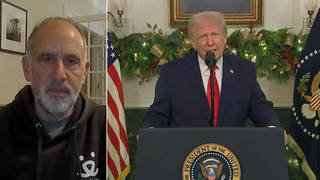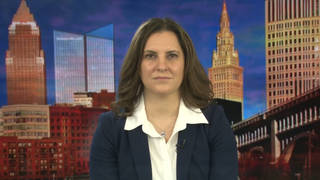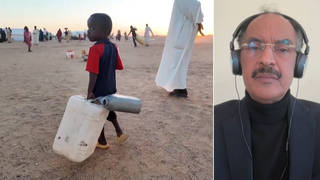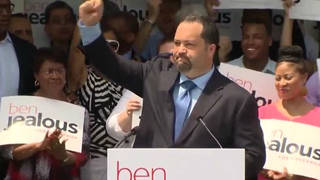
Guests
- D. Watkinseditor-at-large for Salon and author of We Speak for Ourselves: A Word from Forgotten Black America. He is a professor at the University of Baltimore and founder of the BMORE Writers Project.
“We Speak for Ourselves: A Word from Forgotten Black America.” That’s the name of a new book by D. Watkins that amplifies the experiences of poor black Americans typically sidelined by the public and the media—including his own life story. He writes, “I’m from the bottom, and what I mean by bottom is first-generation scholars, the project babies, the people without Wi-Fi, the workers, the people most likely to get hit by police bullets. We are the subjects of protests, the rarely heard-from even as our deaths are debated by media personalities who wouldn’t step foot on our blocks. … To quote the brilliant scholar and activist Dr. Su’ad Abdul Khabeer, 'You don't need to be a voice for the voiceless. Just pass the mic.’” D. Watkins is a professor at the University of Baltimore and founder of the BMORE Writers Project. He is also the author of “The Cook Up: A Crack Rock Memoir” and “The Beast Side: Living and Dying While Black in America.”
Transcript
AMY GOODMAN: This is Democracy Now! I’m Amy Goodman, with Juan González.
JUAN GONZÁLEZ: We turn now to another voice from Baltimore: D. Watkins, editor-at-large for Salon and best-selling author of the new book We Speak for Ourselves: A Word from Forgotten Black America. In his book, Watkins amplifies the experiences of poor black Americans he says are typically sidelined by the public and the media, including his own life story. He writes, quote, “I’m from the bottom, and what I mean by bottom is first-generation scholars, the project babies, the people without Wi-Fi, the workers, the people most likely to get hit by police bullets. We are the subjects of protests, the rarely heard-from even as our deaths are debated by media personalities who wouldn’t step foot on our blocks. … To quote the brilliant scholar and activist Dr. Su’ad Abdul Khabeer, 'You don't need to be a voice for the voiceless. Just pass the mic.’”
AMY GOODMAN: D. Watkins joins us now in our New York studio, professor at the University of Baltimore, founder of the BMORE Writers Project, also the author of The Cook Up: A Crack Rock Memoir and The Beast Side: Living and Dying While Black in America.
Welcome back to Democracy Now! It’s great to have you with us, D.
D. WATKINS: Thank you, guys, for having me.
AMY GOODMAN: And congratulations on the book. Talk about your own life story.
D. WATKINS: So, I grew up in a place where—and it’s crazy because—you know, again, I don’t step out there and try to be the voice for everybody. I can only speak for myself. But a lot of people from my community, we don’t have like big connections to huge groups of activists, right? This is like a brand-new culture for us. We don’t have, you know, the media personalities who get the opportunity to debate and talk about our stories a lot. So, you know, when these things happen, these viral killings and these viral murders, and we see these names danced and tossed around the screen, a lot of people who actually are the victims, they don’t—you know, they don’t get a chance to interact with these types of people before it happens, until we get like brand-new hashtags. So, this has been like the basis of not just my story, but the story of like a whole lot of people. So, I try my best to use my platform to elevate other people, so that we can build like a bigger narrative for what the contemporary black experience is.
JUAN GONZÁLEZ: And you were listening to this previous segment that we had on the student protests in Baltimore at Johns Hopkins. Of course, Johns Hopkins is this elite school in the middle of a majority-black city.
D. WATKINS: I went to school there, and I taught there. It’s not fun.
JUAN GONZÁLEZ: Incidentally.
D. WATKINS: You know, you feel like, when you are a black person—well, my experience there has been like, you know, I kind of felt like an alien. So, when I heard the message about Ron Daniels kicking the BSU out of his house, it wasn’t like a strange thing for me. Baltimore’s a 65% black city. You can probably count the tenured professors of color on like one hand. You know, so what those students are going through and what they’re fighting, it’s a real thing. And, you know, giving them a police force could potentially lead to the murder of an innocent person. Like, it’s not even—you know, it sounds so sad and horrible for me to say it, but it’s the reality, something that could definitely happen.
AMY GOODMAN: You have a chapter in your book, “I’m Sick of Woke.” What do you mean?
D. WATKINS: Sick of woke culture. It’s like everybody’s running around, you know—and it’s crazy, because it started from a great place. It’s a great place when you’re calling out people and when you’re challenging systems and when you’re trying to make it better for everybody. It’s great. But when it gets to the point where like, you know, you’re using terminology like “microaggression” and “intersectionality” and all of these different things to demonize people who don’t even know what you’re talking about, it creates like these hierarchies within movements and these hierarchies within different classes of people. And it just—it gets ridiculous. You know, it’s becoming like, you know, fake thugs. You know what I’m saying? Like, you have to have this bravado and then this sea of words and language that everyone has to adhere to, when it’s just—it becomes even more divisive, and it fights against what it’s actually supposed to mean.
JUAN GONZÁLEZ: I wanted to ask you about—you have a chapter in your book on “The Tradition of Failure,” on education. And you say, near the beginning, “The lack of progress made in public schools over the last fifty years is embarrassing and anyone who has the power to fix this but chooses not to truly wants poor black kids to fail.” And you go on, the history of education in relationship to African Americans and the system of failure.
D. WATKINS: Yeah, it’s like, what was like—name one subject you hated in school when you were growing up.
JUAN GONZÁLEZ: I would say math.
D. WATKINS: OK. So, imagine doing it in like freezing cold. You know what I’m saying? And this isn’t the freezing cold in 1965. This is 2017, 2018 and 2019, where there are videos of students in Baltimore City Public Schools, you know, trying to take notes, but they’ve got to stop to blow on their hands, while they’ve got coats and scarves and earmuffs on, because the inside of that school is freezing. And, you know, the governor, Larry Hogan, didn’t make a statement or say anything about it until the video started going viral. So it’s never like—you know these issues exist. You’ve been—everybody knows. We’ve been talking about it for a long time. If my older brother and cousins and friends and all of the people who went to schools always talked about the resources that they didn’t have and how messed up it was, and then my dad and his generations of people that he came up with always talk about how bad the schools were, and then I have the same thing, and then my nephews and their little friends are saying the same thing, it’s like: At what point do we fix this? You know, it’s 2019.
AMY GOODMAN: Let me go to President Obama talking about race and policing at a 2016 town hall that was hosted by ABC News.
PRESIDENT BARACK OBAMA: Their is real concern about making sure that interactions between police and community don’t result in death. And nobody wishes that more than police officers themselves, because when you talk to those police officers who have—whether justified or not, whatever the findings, have ended up killing somebody, it shatters them, too. I don’t know anybody in the African-American community or Latino community or others, that may have concerns about policing, that don’t also recognize we need police.
AMY GOODMAN: So, that was Barack Obama, when he was president, at a town hall. You were there, D. Watkins. Can you respond to what he said, and what President Obama meant to you, and then President Trump?
D. WATKINS: You know, so, that was like a special day for me, because Obama was like my big entry into—like, I literally write and study and read politics all day, every week, for me. So I’m really into it. And that came from following his election. So, the minute I get an email telling me I actually get to go sit in a room with this guy who’s meant so much to me was like amazing.
And then, when I’m sitting there and I’m hearing him talking about how, you know, we can’t really prosecute police officers because we need them to protect us, I’m like, “Man, they’re blowing our heads off.” And it was a difficult thing. So, you know, part of me was like, “Well, OK, so he’s going to say what he has to say, because this is around the time Trump was starting to catch steam.” This is when the MAGA rallies started popping up, and he started to get popular. But at the same time, we were in a room full of victims. One of them was Erica Garner, and she was promised a chance, you know, to be able to tell her story and talk about her experience and how the man who killed her father actually got a raise from overtime with his new desk job after that happened. So, it was—
AMY GOODMAN: That was Eric Garner.
D. WATKINS: Yeah, Eric Garner. So, it was—it started off as being like a great experience, but it ended up being a rough day, because that’s—you know, the conversation was called, like, “The President and the People,” and, you know, the people—Erica was definitely the people, because, like Tawanda, she was out there all of the time, like trying to get justice for her dad. And she had this opportunity, and which really wasn’t an opportunity, so they brought her down there for nothing.
JUAN GONZÁLEZ: But she never got to speak at that town hall, did she? Or did she?
D. WATKINS: So, she got to speak, but she didn’t get to speak like—nobody—only people who knew were people who were there. And that’s because she exploded and stormed off the set. So, when she left the set, Secret Service was like, “Whoa, where are you going there?” And she was like, “Yo, don’t touch me. This is horrible.” And someone from Obama’s team had reached out and was like, “OK, well, you’re going to get to talk to him for like two seconds.” And she told me and some other people who—we were all going back to the train station, because they were going to New York and we were going back to Baltimore. And she was like, “Yo, he basically said that he can’t really speak on what’s happening because this Dallas police situation is helping Trump out.” And she’s like, “I don’t care about that. Like, why does everything have to be about politics? I care about this person who killed my father going to jail, and it looks like it’s not going to happen.”
AMY GOODMAN: And so, your assessment of Trump today and what he’s meant for the African-American community?
D. WATKINS: Absolutely nothing. Like, Trump, Donald Trump, is like a scum. Like, he is everything that—you know, everything we feel when we have an encounter with a racist police officer, everything we feel when we know we’re qualified for a job or a loan that we don’t get, everything that tears us apart as we try to navigate in this country. And again, you know, I’m not the guy who’s trying to say everyone feels like this, but I can say everything that I’ve felt and the struggles I’ve had in academia and in media and in general, you know, is all represented in him. It’s wrapped up in his bloated orange face. Like, all that anger and that aggression is right there. You know, he’s a clear example of it. And he can laugh, and he can joke, and he can, you know, fraud the world, and it’s disheartening to sit back and watch how many people are content with that.
AMY GOODMAN: Well, I want to thank you so much for being with us, D. Watkins, editor-at-large for Salon, his new book, We Speak for Ourselves: A Word from Forgotten Black America. D. Watkins is a professor at the University of Baltimore, founder of the BMORE Writers Project.
That does it for our broadcast. I’ll be speaking Saturday night at 6:00. We’ll be doing a showing of Four Days in Western Sahara: Africa’s Last Colony at University of California, Berkeley. Check our website at democracynow.org.
Democracy Now! has an immediate opening for a full-time digital fellowship here in New York City. I’m Amy Goodman, with Juan González. Thanks so much for joining us.













Media Options